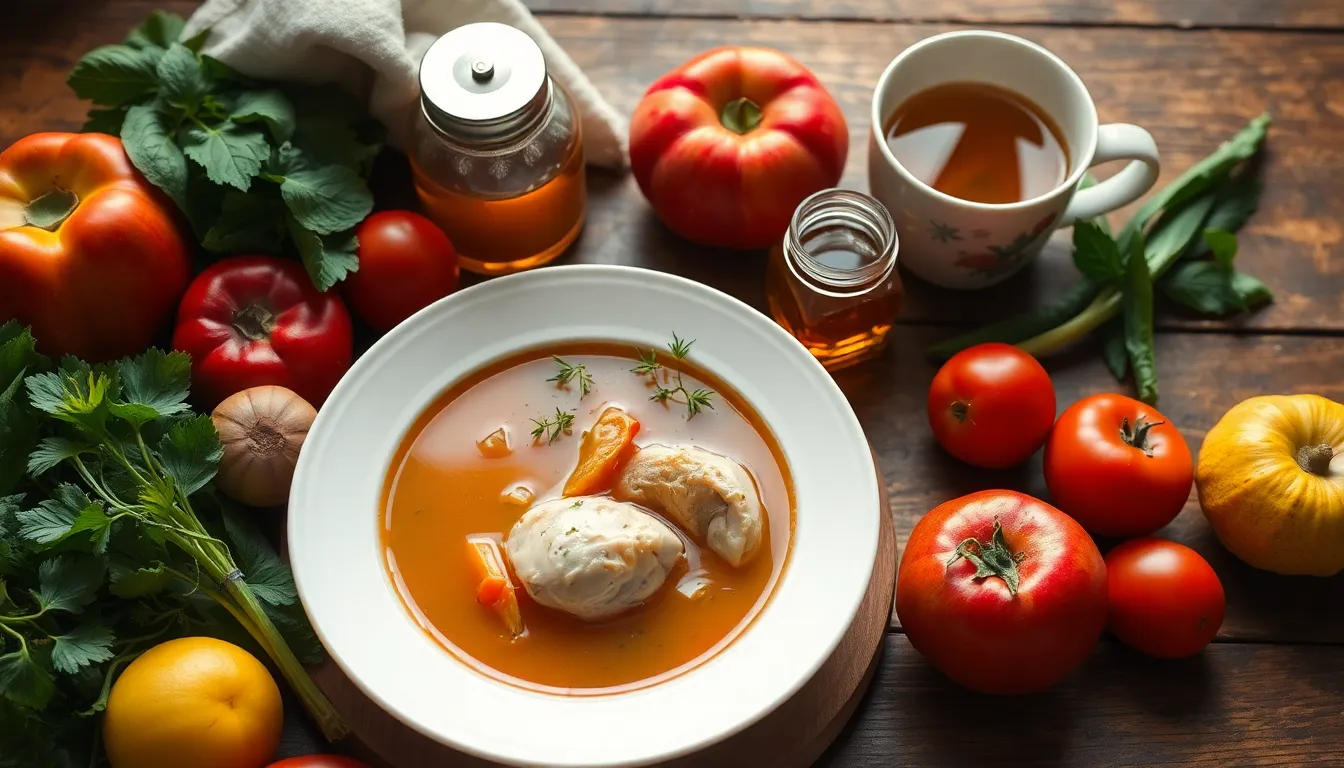Pneumonia can feel like an unwelcome houseguest who refuses to leave, crashing on your couch and hogging the remote. It’s not just annoying; it can be downright dangerous. If you’ve found yourself battling this pesky illness, you’re probably eager to kick it to the curb faster than you can say “antibiotics.”
Table of Contents
ToggleUnderstanding Pneumonia
Pneumonia affects the lungs, leading to inflammation and fluid buildup. Rapid identification and treatment play a crucial role in recovery.
Types of Pneumonia
Bacterial pneumonia arises from bacterial infections, with Streptococcus pneumoniae being a common culprit. Viral pneumonia, caused by viruses such as influenza, also frequently occurs. Fungal pneumonia presents a risk to individuals with weakened immune systems and can stem from organisms like Histoplasma. Aspiration pneumonia happens when food or liquid enters the lungs, leading to infection. Each type exhibits unique characteristics, affecting treatment approaches.
Symptoms of Pneumonia
Symptoms frequently manifest as a cough producing phlegm. Fever often accompanies chills, contributing to general discomfort. Chest pain, especially during breathing, can indicate the severity of the condition. Shortness of breath occurs in conjunction with other symptoms, indicating compromised lung function. Fatigue may persist, significantly impacting daily activities. Recognizing these symptoms early aids in timely medical intervention.
Quick Home Remedies

Home remedies can assist in alleviating pneumonia symptoms and support recovery. Several methods offer natural relief and may enhance overall health during this challenging time.
Herbal Remedies
Garlic serves as a powerful antimicrobial agent. Adding garlic to meals helps fight infections. Ginger acts as an anti-inflammatory, easing airway irritation when consumed as tea. Thyme provides expectorant properties, promoting mucus clearance. Eucalyptus oil may alleviate cough and sinus congestion through inhalation or topical application. Each of these herbs contributes to symptom relief and improved lung function.
Dietary Changes
A nutrient-dense diet plays a crucial role in recovery. Increasing the intake of fruits and vegetables boosts immune support with antioxidants. Soups, particularly chicken soup, offer hydration and soothing effects for sore throats. Incorporating probiotics found in yogurt and fermented foods supports gut health and immune responses. Adequate hydration is vital, so drinking plenty of fluids ensures proper mucous membrane function. Eating small, frequent meals aids in maintaining energy levels without overwhelming the digestive system.
Medical Treatments
Medical treatments play a crucial role in combating pneumonia effectively. Immediate intervention often involves targeted therapies based on pneumonia type.
Antibiotics
Bacterial pneumonia typically requires antibiotic treatment. Doctors prescribe specific antibiotics, such as amoxicillin or azithromycin, depending on the bacteria causing the infection. Choosing the right antibiotic ensures efficient recovery, and adherence to the prescribed course minimizes complications. Patients usually notice improvement within a few days of starting treatment. Regular follow-ups may be necessary to confirm resolution of the infection and evaluate any potential side effects.
Over-the-Counter Medications
Symptom management is essential during pneumonia recovery. Over-the-counter medications can alleviate discomfort, reduce fever, and ease coughing. Acetaminophen or ibuprofen helps lower fever, while cough suppressants provide relief from persistent cough. Expectorants may be beneficial for loosening mucus, aiding in easier breathing. While these medications support symptom control, they don’t treat the underlying infection and should complement prescribed antibiotic therapy. Always consult a healthcare professional before combining treatments to ensure safety and effectiveness.
Importance of Rest and Hydration
Rest plays an essential role in recovering from pneumonia. When the body gets ample sleep, it helps the immune system function effectively, promoting faster healing. Fatigue may worsen symptoms, so prioritizing rest can lead to improved overall health.
Hydration is equally important during this recovery process. Drinking plenty of fluids helps thin mucus, making it easier to expel. Water, herbal teas, and clear broths provide hydration, while soups offer both fluids and nutrients. Combining hydration with nutrient-dense meals supports energy levels, facilitating a more robust recovery.
Balancing both rest and hydration fosters an environment conducive to healing. He or she should listen to their body; if they feel tired, additional rest may be necessary. Staying comfortably hydrated can reduce cough and congestion, easing discomfort while recovering from pneumonia.
Ensuring proper fluid intake during illness can significantly impact strength and stamina. Aim for at least 8 to 10 glasses of water daily; more may be necessary depending on individual circumstances. He or she might include electrolyte-rich beverages when dehydration is a concern.
Prioritizing hydration and rest accelerates recovery. A well-hydrated body performs better in terms of fighting off infections. Incorporating both elements into daily routines creates a solid foundation for healing from pneumonia.
Prevention Tips
Preventing pneumonia requires proactive measures. The following strategies enhance protection against this respiratory illness.
Vaccination
Vaccination serves as a crucial defense against pneumonia. The pneumococcal vaccine protects against bacterial pneumonia caused by Streptococcus pneumoniae. It’s recommended for children under two years and adults over 65 years. Annual flu shots minimize the risk of viral pneumonia. These vaccines significantly reduce the incidence of severe respiratory infections. Consulting healthcare providers ensures appropriate vaccinations based on age and health status.
Lifestyle Changes
Making lifestyle changes bolsters the immune system and reduces pneumonia risk. Regular exercise strengthens overall health and promotes lung function. A balanced diet rich in fruits, vegetables, and whole grains provides essential nutrients supporting immunity. Avoiding smoking and limiting alcohol intake also contribute to healthier lungs. Maintaining good hygiene practices, like handwashing and avoiding close contact with sick individuals, prevents infection spread. Prioritizing sleep further aids recovery and enhances the body’s defenses against illnesses, allowing for quicker recovery from any respiratory condition.
Recovering from pneumonia requires a multifaceted approach that combines medical treatment with supportive home remedies. By recognizing symptoms early and seeking timely medical care, individuals can significantly improve their chances of a swift recovery. Incorporating nutrient-rich foods and staying hydrated plays a crucial role in healing.
Rest is equally important as it allows the immune system to function optimally. Preventative measures such as vaccinations and healthy lifestyle choices can also reduce the risk of pneumonia. With the right strategies in place, individuals can effectively combat pneumonia and return to their daily lives sooner rather than later.





